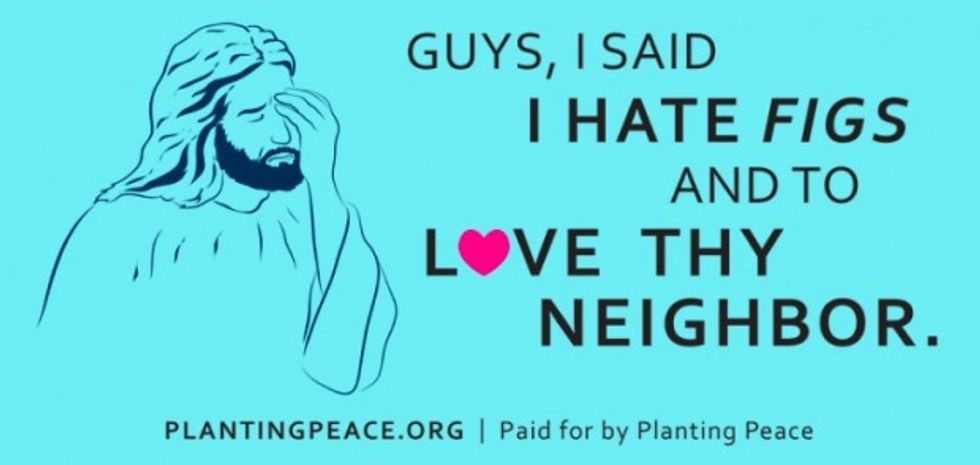
Photo credit: Shutterstock

A billboard in Jackson, Mississippi, is taking aim at the state's new law permitting public and private businesses to refuse service to same-sex couples based on employers' religious beliefs, invoking a Bible verse to try and make a point about Jesus and loving one's neighbor.
Mississippi Gov. Phil Bryant signed contentious House Bill 1523 into law on Tuesday, leading to intense debate over the provisions held within. One of the reactions to the bill comes in the form of a billboard from Planting Peace, a Kansas-based civil rights organization.
The giant image, which has been placed in Jackson, features a seemingly frustrated Jesus along with a line of text that reads, "Guys, I said I hate figs and to love thy neighbor."

"Our latest billboard sends a message about literal interpretations of the bible and addresses some of the hateful, homophobic language anti-LGBT hate groups often feature on their protest signs," Planting Peace said in a statement released on Tuesday. "In Matthew 21:18-22, Jesus literally curses a fig tree. But we don’t see a lot of 'God Hates Figs' protests or cries for stronger legislation regulating figs."
The story about Jesus and the fig tree is also recounted in Mark 11:12-14, though there's context that some theologians believe is at play rather than an intended literal call for Christians to condemn figs. Before we dive in there, let's explore Matthew 21:18-22, which reads:
Early in the morning, as Jesus was on his way back to the city, he was hungry. Seeing a fig tree by the road, he went up to it but found nothing on it except leaves. Then he said to it, “May you never bear fruit again!” Immediately the tree withered. When the disciples saw this, they were amazed. “How did the fig tree wither so quickly?” they asked.Jesus replied, “Truly I tell you, if you have faith and do not doubt, not only can you do what was done to the fig tree, but also you can say to this mountain, ‘Go, throw yourself into the sea,’ and it will be done. 22 If you believe, you will receive whatever you ask for in prayer.”
Now, let's explore what's some theologians and biblical experts believe is really going on in those scriptures. Here's how GotQuestions.org explained the purported symbolism at play:
As to the significance of this passage and what it means, the answer to that is again found in the chronological setting and in understanding how a fig tree is often used symbolically to represent Israel in the Scriptures. First of all, chronologically, Jesus had just arrived at Jerusalem amid great fanfare and great expectations, but then proceeds to cleanse the Temple and curse the barren fig tree. Both had significance as to the spiritual condition of Israel. With His cleansing of the Temple and His criticism of the worship that was going on there (Matthew 21:13; Mark 11:17), Jesus was effectively denouncing Israel’s worship of God. With the cursing of the fig tree, He was symbolically denouncing Israel as a nation and, in a sense, even denouncing unfruitful “Christians” (that is, people who profess to be Christian but have no evidence of a relationship with Christ).The presence of a fruitful fig tree was considered to be a symbol of blessing and prosperity for the nation of Israel. Likewise, the absence or death of a fig tree would symbolize judgment and rejection.
"Matthew Henry's Commentary" also dives deep into these theological issues, noting that the act was done by Jesus, in part, to "show that all judgment is committed to him, and that he is able not only to save, but to destroy."
The commentary went on to say that the cursing of the fig tree was also representative of hypocrites in general, explaining that God looks for fruit among those who profess to believe.

Beyond that, there is also a parallel that has been drawn between Israel and the Jews, with Christ coming to them expecting to find fruit, but becoming frustrated by the reality of what he encountered ("nothing but leaves," according to Matthew Henry's Commentary).
"They called Abraham their father, but did not do the works of Abraham," the text continues. "They professed themselves expectants of the promised Messiah, but, when he came, they did not receive and entertain him."
There are deeper and more complex explanations as well, showing that the traditional understanding is anything but a request for Bible-believers to take a negative view go figs.
Regardless, Planting Peace is clearly hoping to send a message to supporters of the new-found Mississippi law.
The group went on in its statement to accuse the "anti-LGBT movement" of continuing "to seek ways to take us backwards."
"The anti-LGBT movement is comprised of a substantial number of zealots who unfailingly refer to their rigid interpretation of religious text to narrowly define 'traditional' institutions and values," the statement read. "They pick and choose what they wish to convey as immoral and unacceptable, while seemingly sweeping lines of scripture just a few letters away completely under the rug."
Planting Peace said that the Jesus-themed billboard is an effort to respond to legislators, among others, who have supported the law.
(H/T: Daily Mail)
--
Front page image via Shutterstock.com.
--
Follow the author of this story on Twitter and Facebook:
Billy Hallowell